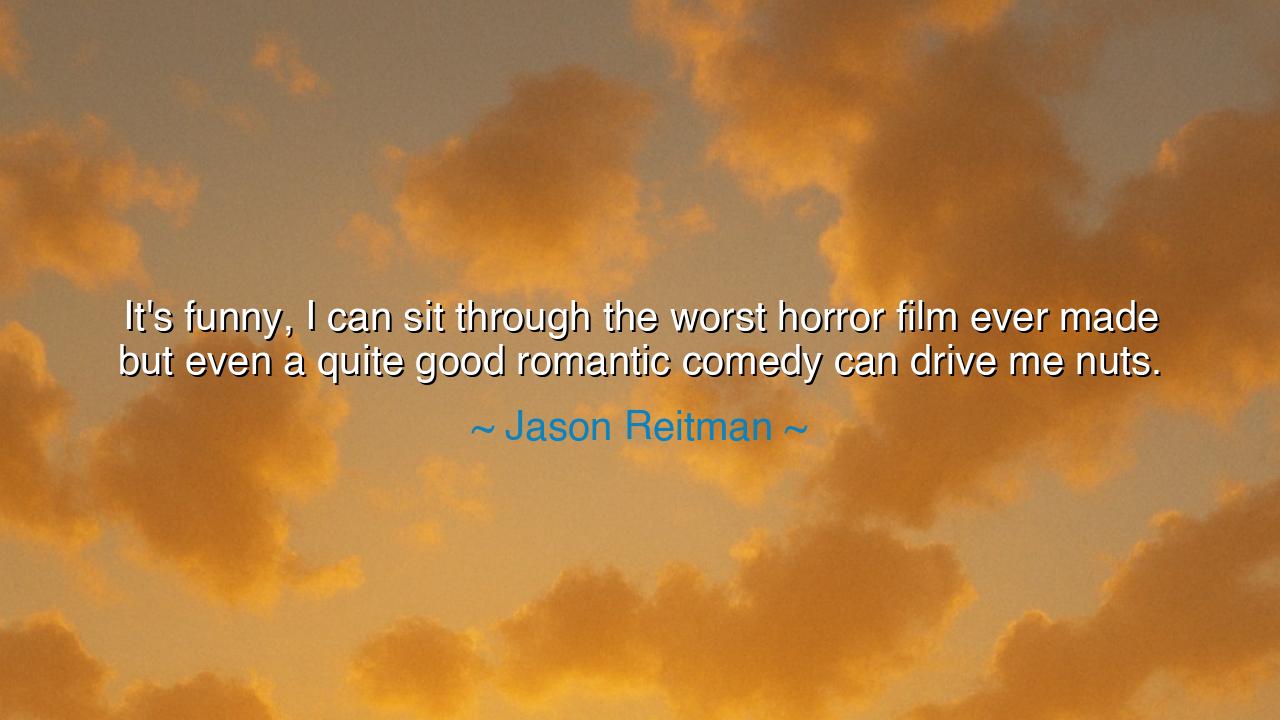
It's funny, I can sit through the worst horror film ever made but
It's funny, I can sit through the worst horror film ever made but even a quite good romantic comedy can drive me nuts.






In the words of Jason Reitman, “It’s funny, I can sit through the worst horror film ever made but even a quite good romantic comedy can drive me nuts.” At first, these words strike us as playful, a confession of taste. But beneath them lies an insight into the human heart and into art itself: that what unsettles us most is not always terror or blood, but sentiment handled without truth. For the soul can endure the artifice of monsters, but it recoils at falseness in the most sacred of stories—those of love.
The ancients knew well the difference between art that terrifies and art that deceives. The Greeks filled their theatres with tragedy and comedy, with tales of gods, kings, and monsters. Audiences endured horrors—blind Oedipus, raging Medea—yet they left the theatre purified, instructed, strengthened. But when a play rang hollow, when love was portrayed without depth, it stirred not catharsis but irritation. For the heart desires truth above all things, and when romantic tales fail to ring true, they wound the spirit more than crude depictions of violence.
Reitman’s words remind us that horror films, even the worst, often retain a certain honesty. They confront the fear of death, the shadow of the unknown, the terror that lives in all human beings. Even poorly crafted, such films admit openly: “Here is fear, and we will face it together.” But when a romantic comedy reduces love to shallow formulas, it betrays the noblest of human longings. Love is sacred, and to treat it without sincerity is to desecrate it. Thus, it is not the silliness of horror that offends, but the falseness of hollow romance.
History offers us examples of this truth. Consider Shakespeare, who wrote both comedies and tragedies. His comedies—though light—still brim with wit, honesty, and recognition of human weakness. Benedick and Beatrice, in Much Ado About Nothing, spar with words that cut and heal, showing love’s truth wrapped in laughter. His tragedies, meanwhile, do not spare the audience from horror, yet they never feel hollow, for they arise from the deepest realities of ambition, jealousy, and fate. Even when monstrous, they are true. This is why they endure, while countless shallow tales are forgotten.
The deeper meaning of Reitman’s quote is that love, more than fear, demands reverence. To show monsters without subtlety may amuse; to show love without sincerity insults. The romantic comedy, when crafted with depth, uplifts the soul and reveals the beauty of human connection. But when it follows only formulas, when it ignores the mysteries of the heart, it becomes unbearable, a parody of life’s highest calling.
The lesson, then, is this: demand truth from the stories you consume, and demand it especially in matters of love. Let art terrify you, challenge you, even disturb you—but let it never lie to you. Celebrate films, plays, and books that treat love with honesty, whether through laughter or sorrow. And if you yourself tell stories—whether on the page, on the stage, or in daily life—let them be sincere, for sincerity is the only path to beauty.
And what must you do in your own life? Seek not the hollow comfort of clichés. When you speak of love, speak truthfully, even if it is clumsy, even if it is frightening. Let your expressions of affection carry weight, sincerity, and vulnerability. Do not fear the monstrous or the terrifying, for these are easier to face than the falseness of empty gestures. Remember always: the heart is strengthened by truth, but it is wearied by lies. In this way, Reitman’s words become a timeless teaching—better the worst horror film than a false romantic comedy, for the soul would rather endure fear than endure love stripped of its sacred truth.






AAdministratorAdministrator
Welcome, honored guests. Please leave a comment, we will respond soon